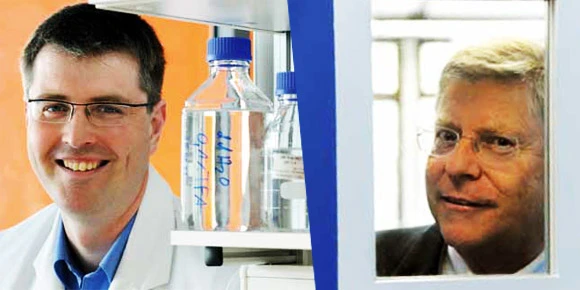Analyse, identify, quantify
Adlershof biotech companies have adopted a powerful position on the world market with their innovative analytical methods for protein manufacture
Proteins are the elementary building blocks of life. Yet there is much about these substances that is yet to be researched. Especially in the human body, molecules and their interactions are complex, and often too complex for the customary research methods. Nevertheless, scientists are working on the analysis of the proteome, not least of all for advancing medical knowledge. These advances are also being boosted by Adlershof biotechnology companies like Proteome Factory AG and its development of new analytical and synthesis technologies. Headed by Christian Scheler, this company specialises in proteomics, biomarker identification, protein analysis, and proteomic bioinformatics. “We provide our customers and partners with one of the most modern and most innovative key technologies for proteomics.”
The “key technology of the next generation” is how the team headed by Scheler describes their ultra sensitive mass spectroscopy system that can identify and quantify proteins with a precision never before attained. This will also help to generate synthetic proteins.
However, tailoring proteins for pharmaceutical industries, research, and medicine is a tricky business. And it is exactly this that RiNA GmbH knows how to do. This company develops and markets systems that can produce acellular proteins. This quickly made a name for the company, which was disincorporated from the Biochemistry Institute of the Freie Universität Berlin in 1998 on the initiative of the RNA (ribonucleic acid) researcher Volker Erdmann. Since launching its invitro protein expression kits for extracellular protein analyses, it has gained renown as a specialist in applications that require proteins for functional, structural, screening and interaction analyses, but also for manufacturing antibodies.
RiNA has succeeded in supplying tailored proteins of absolutely identical quality that can be modified to virtually any extent to the needs of its customers. The method has been patented and is superior to others: “The greatest advantages are that this open system allows the optimal modification of conditions for individual proteins, culminating in the synthesis of toxic proteins and the introduction of synthetic amino acids,” explained Leo Tristram, Managing Partner of RiNA.
In its niche, the company has long been held by experts to be the hidden champion on this sector. “The performance of our systems in the synthesis of proteins is unparalleled in this field,” explained Helmut Merk, member of the management board. He also added self confidently, and rightly so: “We are the technology leaders in key segments of this field.”
By Chris Löwer for Adlershof Special
